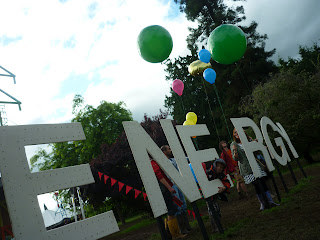Muddy boots, leaking tents, and a home-made power station firing ping-pong balls at delighted festival goers as the heavens
opened somewhere deep in the Welsh Black Mountains - this was public engagement
at its most extreme!
It all started very sedately around a warm
and dry meeting table where PhD students from the Doctoral Training Centre in
Low Carbon Technologies at the University of Leeds as well as representatives
from the University of Bristol and University College London learned of RCUK’s
plan to fund an ambitious public engagement project with the theme of Energy at
the Green Man music festival in Wales.



